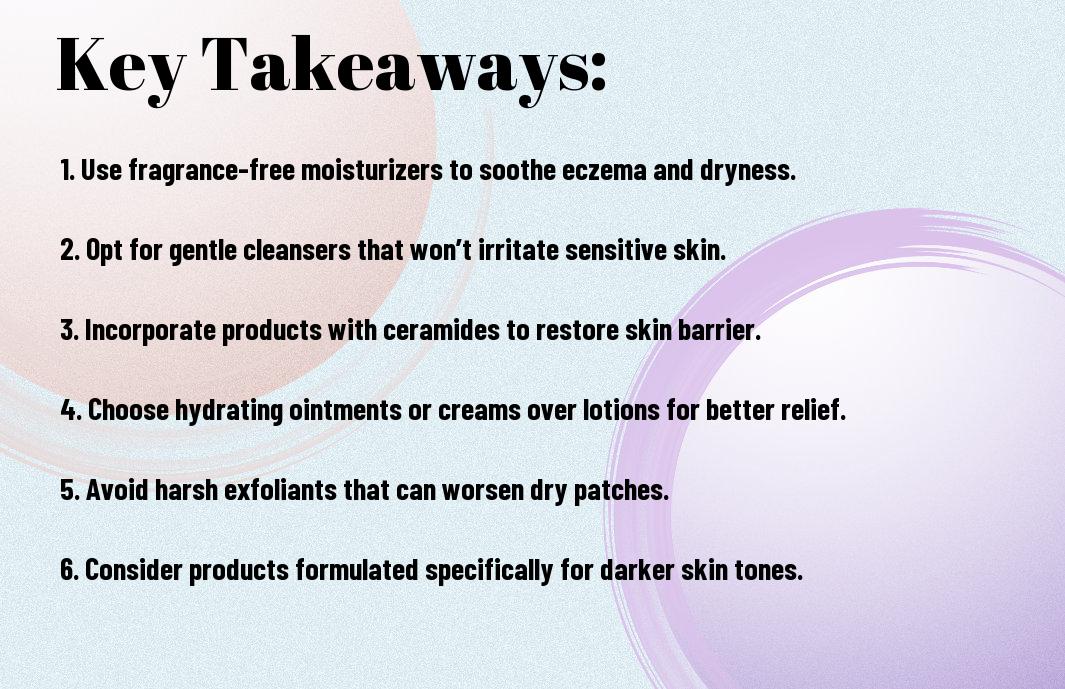
Skincare is a journey that can be particularly challenging for women of color facing eczema and dry patches. I’ve experienced firsthand the discomfort and confusion that comes with finding products that cater specifically to our unique skin needs. In this post, I’ll share effective products and strategies that can help you manage your skin condition while embracing your natural beauty. By understanding your skin’s requirements and being mindful of ingredients, you can achieve healthier, vibrant skin. Let’s explore solutions that empower you and enhance your skincare routine.
Key Takeaways:
- Identify eczema triggers to better manage symptoms.
- Select moisturizers that contain ingredients like ceramides, shea butter, and hyaluronic acid for optimal hydration.
- Consider fragrance-free and hypoallergenic products to reduce the risk of irritation.
- Incorporate gentle cleansers that maintain the skin’s moisture barrier without stripping natural oils.
- Look for products with gut-friendly probiotics that can support skin health from within.
- Consult with dermatologists for personalized skincare recommendations tailored to skin types common among women of color.
- Patch test new products before fully incorporating them into your regimen to avoid adverse reactions.

The Unique Challenges of Eczema in Women of Color
With varying skin tones and textures, women of color face specific challenges regarding eczema. This condition can manifest differently, often leading to hyperpigmentation or dark patches on the skin due to inflammation. In my experience, the visibility of eczema spots can affect self-esteem, making it vital to address these unique skin concerns with tailored treatments made for your skin type. Furthermore, cultural factors may influence the approach to skincare, including the products we use and the healthcare resources available to us.
Dispelling Myths: Prevalence and Perception
Eczema is often thought to be less common in women of color, but studies show that it affects diverse populations significantly. In fact, about 10% of Black children and a similar percentage of adults experience this condition. Common misconceptions may prevent individuals from seeking help or the right products that cater specifically to their skin tones and needs, leading to a cycle of discomfort and dissatisfaction.
Understanding Skin Function and Reactions
The barrier function of your skin plays a major role in how it reacts to irritants and allergens. In women of color, skin tends to be more resilient but can also exhibit different signs of inflammation. For example, the stratum corneum might be thicker, which can sometimes mask symptoms of eczema until they worsen. Recognizing how your unique skin interacts with external factors is crucial in developing a personalized skincare routine that effectively addresses your symptoms while preventing flare-ups.
One vital aspect of understanding skin function lies in recognizing the balance of moisture and oil. With eczema, your skin barrier may be compromised, leading to increased trans-epidermal water loss (TEWL). If you experience dryness or discomfort, it’s crucial to select products that not only hydrate but also reinforce the barrier function of your skin. Look for ingredients like ceramides, hyaluronic acid, and glycerin, which work harmoniously to restore moisture and improve overall skin integrity, helping to soothe inflammation while promoting healthy skin function.
Ingredients That Heal: What to Look For
Focusing on specific ingredients can elevate your skincare routine and effectively combat eczema and dry patches. Look for products that feature natural emollients, such as shea butter or coconut oil, which help lock in moisture. Ingredients like ceramides work wonders in restoring the skin barrier, while hyaluronic acid provides intense hydration. Additionally, consider formulations that include botanical extracts, like chamomile or calendula, known for their soothing properties. These elements are important allies in your quest for healthier skin.
Essential Moisturizers and Their Role
Moisturizers serve as your first line of defense against dryness and irritation. They create a protective barrier on the skin, preventing moisture loss and allowing other beneficial ingredients to penetrate more deeply. When choosing moisturizers, opt for those that blend both occlusives and humectants; the former seals in moisture, while the latter draws it from the environment to hydrate your skin effectively.
Active Ingredients: The Science Behind Relief
Active ingredients are the powerhouse components that deliver therapeutic effects. Look for formulations that include topical steroids to reduce inflammation, or tacrolimus, which modulates the immune response to tackle eczema flare-ups. Research also highlights the effectiveness of niacinamide, known for its skin barrier repair properties, along with colloidal oatmeal, which offers relief from itching and irritation. Combining these elements in your skincare routine can significantly improve your skin’s health.
The efficacy of these active ingredients often stems from their ability to target specific skin concerns associated with eczema and dryness. Topical steroids are invaluable for managing flare-ups and decreasing inflammation, while tacrolimus offers an alternative for those wary of steroids’ side effects. Additionally, niacinamide supports skin barrier function and enhances moisture retention, making it particularly beneficial for women of color. Lastly, colloidal oatmeal not only soothes the skin but also reduces redness and irritation. This potent combination ensures that your skin receives both immediate relief and long-term benefits, paving the way for healthier, more resilient skin.
Navigating the Skincare Aisle: Recommended Products
Finding the right products in a saturated skincare market can feel overwhelming, especially for women of color dealing with eczema or dry patches. Prioritize formulas that offer intense hydration and protection while being suitable for your specific skin type. Let’s explore some effective options to enhance your skincare routine.
Top Moisturizers for Protection and Healing
When opting for a moisturizer, look for those rich in ceramides, hyaluronic acid, and sheabutter. These ingredients deeply hydrate your skin while forming a protective barrier. Brands like CeraVe and Aquaphor consistently win praise for their long-lasting effects. You’ll notice improved skin texture and a reduction in dry patches almost immediately.
Specific Brands That Cater to Diverse Skin Types
Brands that understand the unique needs of women of color include SheaMoisture, Black Girl Sunscreen, and Fenty Skin. Their formulations prioritize hydration while addressing the inflammation associated with eczema. For instance, SheaMoisture’s healing oils are particularly effective at soothing irritation and restoring moisture. You’ll find that these ranges celebrate melanin-rich skin by being inclusive and effective.
| Brand | Key Features |
| CeraVe | Contains ceramides, promotes skin barrier repair |
| Aquaphor | Occlusive agent, ideal for preventing moisture loss |
| SheaMoisture | Natural ingredients, caters to ethnic skin |
| Black Girl Sunscreen | Specifically formulated for darker skin tones |
| Fenty Skin | Inclusive care, blends hydration with protection |
It’s important to choose brands that not only cater to your skin type but also showcase an understanding of diverse skin tones. Many brands now offer lines that prioritize high-quality ingredients while providing a range suitable for darker skin. I highly recommend checking out products from the businesses mentioned above to find a solution that resonates with your skincare needs.
| Brand | Specialty |
| HydraFacial | Deep cleansing, hydrating treatments |
| Palmer’s | Cocoa butter products for intense moisture |
| Kiehl’s | Focus on botanical ingredients |
| Olay | Targeted anti-aging and hydrating solutions |
| Neutrogena | Broad product range for varied skin concerns |
- Brand selection is vital.
- Look for specific ingredients that target dryness.
- Consider products with natural oils for added moisture.
- Hydration is key to effectively managing eczema.
- Any products that align with your skin’s needs can make a significant difference.
Building a Consistent Skincare Routine
A consistent skincare routine is key to managing eczema and dry patches effectively. I recommend starting with a gentle cleanser to remove impurities without stripping your skin’s natural moisture. Follow this up with a hydrating toner or essence to boost moisture levels. Next, incorporate a targeted moisturizer rich in emollients and occlusives to lock in hydration. Finally, don’t forget to apply sunscreen daily to protect your skin from UV damage, which can exacerbate dryness and irritation. Consistency is vital; maintaining this routine can lead to smoother, healthier skin over time.
Steps for Daily and Weekly Care
For daily care, focus on a simple regimen: cleanse, treat, moisturize, and protect. I usually cleanse twice a day, applying a suitable treatment product only on affected areas afterward. In the evenings, a richer cream or ointment can provide added overnight hydration. Once a week, I recommend introducing a gentle exfoliation, using ingredients like lactic acid, to help remove dead skin and promote cell turnover. This combination keeps my skin feeling fresh and allows other products to penetrate better.
Additional Therapies: When to Seek Professional Help
If your symptoms persist despite following a consistent routine, seeking professional help can provide additional support. A dermatologist can assess your condition and may recommend prescription treatments such as *topical corticosteroids* or *immunomodulators*. Sometimes, *phototherapy* or specialized products may also be indicated to alleviate more severe cases of eczema or stubborn dry patches.
Chronically dry skin or eczema that doesn’t improve with over-the-counter products is often a signal to visit a dermatologist. They can perform a thorough evaluation and may suggest treatments tailored to your specific needs, such as allergy testing to identify triggers or medications to reduce inflammation. Additionally, they can provide guidance on integrating lifestyle changes or dietary adjustments that can further enhance your skin’s health. Don’t hesitate to seek help; your skin deserves the best care possible.

Empowering Voices: Personal Stories and Insights
Sharing stories is a powerful way to connect and understand the unique challenges faced by women of color dealing with eczema and dry patches. Through these experiences, we find commonality; we learn that our struggles are valid, and we recognize the strength found in vulnerability. Each story is a testament to resilience and creativity in navigating skincare and self-acceptance. Women bravely recount their trials, illuminating various paths to healing while fostering a supportive community that uplifts rather than shames.
Overcoming Stigma: Real Experiences of Women of Color
Many women of color have faced stigma and misunderstanding regarding their skin conditions, often attributing them to poor hygiene or lack of self-care. By sharing their struggles, they highlight how vital it is to confront these misconceptions head-on. One woman savored the liberation of embracing her skin after years of feeling ashamed, while another shared her journey of educating family and friends to promote understanding and empathy. These narratives reinforce the importance of community support in dismantling harmful stereotypes.
Community Resources and Support Networks
Connecting with others who understand your journey can make a significant difference. Numerous community resources and support networks specifically cater to women of color navigating skin issues. Organizations like the National Eczema Association and local support groups foster discussions and provide access to vital information about management techniques, product recommendations, and emotional support.
Many of these networks host workshops focused on empowering women with knowledge about skincare and self-advocacy, helping them to overcome the barriers imposed by cultural misunderstandings and stigma. Participating in online forums and social media groups dedicated to eczema awareness allows you to connect with others facing similar struggles. I’ve found immense comfort in knowing I’m not alone; sharing advice and experiences within these communities reinforces the healing journey we all strive for while providing a platform for our voices to be heard.
To wrap up
Ultimately, addressing eczema and dry patches requires a thoughtful approach to skincare, especially for women of color. By choosing the right products that cater to your unique skin type, you can effectively manage and soothe your skin’s needs. I encourage you to experiment with natural ingredients, moisturizers, and treatments specifically formulated to address hyperpigmentation and dryness. Your journey towards healthier skin can be empowering, and with the right solutions, you can regain your confidence and comfort.
FAQ
Q: What causes eczema and dry patches, particularly in women of color?
A: Eczema can be triggered by various factors such as dry skin, environmental irritants, allergens, and stress. For women of color, unique skin types and conditions, such as hyperpigmentation, can also play a role in how eczema appears and is treated. Genetics can also contribute to susceptibility to eczema, making it imperative to understand one’s own skin and how it reacts to certain products.
Q: How can I best choose skincare products for eczema?
A: When dicking out skincare products for eczema, look for those that are hypoallergenic, fragrance-free, and formulated for sensitive skin. Ingredients like ceramides, hyaluronic acid, and colloidal oatmeal can be beneficial. It’s advisable to conduct a patch test on a small area of skin to see how the product reacts before using it more widely.
Q: Are there specific ingredients to avoid in skincare products for eczema?
A: Yes, avoid products with harsh chemicals, fragrances, and dyes, as these can aggravate eczema. Common irritants include alcohols, parabens, and synthetic additives. Reading labels carefully can help ensure you’re not using products that may worsen dry patches or inflammation.
Q: How often should I apply moisturizer to prevent dry patches?
A: It’s best to apply moisturizer at least twice daily, or more frequently if needed, especially after bathing when skin is still damp. This helps to retain moisture and create a protective barrier. Consistent use of a suitable moisturizer can significantly improve skin hydration and minimize dryness.
Q: Can dietary choices influence eczema symptoms?
A: Yes, certain foods can trigger or worsen eczema symptoms in some individuals. Common culprits include dairy, gluten, soy, and nuts. Keeping a food diary can help identify potential triggers. Consult with a healthcare professional or a nutritionist for personalized advice on how to manage your diet in relation to eczema.
Q: Are over-the-counter products effective for managing eczema in women of color?
A: Over-the-counter treatments, such as hydrocortisone cream or moisturizing ointments, can be effective for mild to moderate eczema. However, severe cases may require a prescription-strength topical steroid or other medicines from a dermatologist, especially to manage flare-ups and reduce inflammation.
Q: What lifestyle habits can help manage eczema and dry patches?
A: Maintaining a well-hydrated skin care routine, using gentle cleansers, and avoiding long hot showers can help manage eczema. Wearing breathable fabrics, managing stress through relaxation techniques, and avoiding known skin irritants are also beneficial lifestyle choices for those suffering from eczema.











